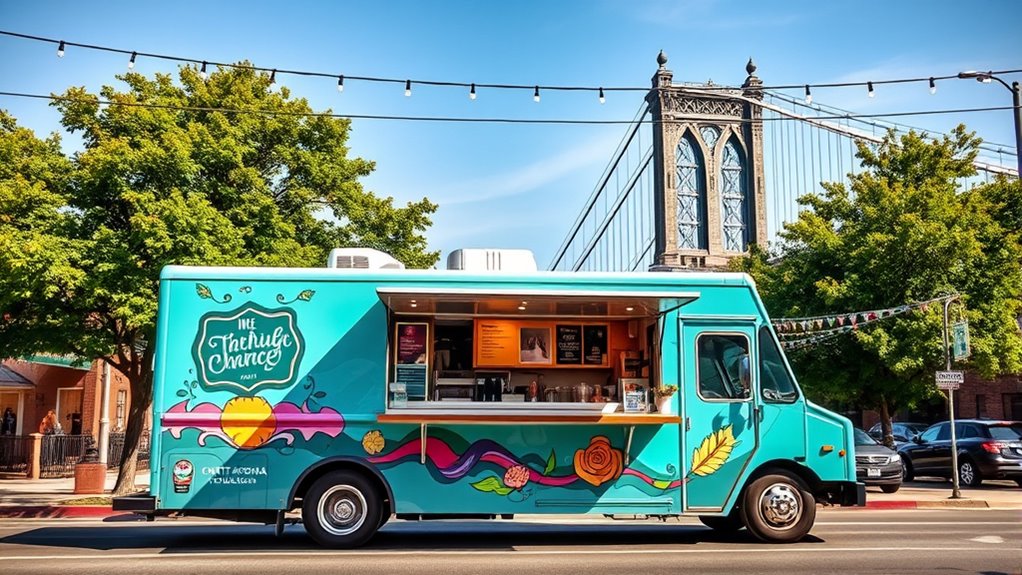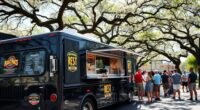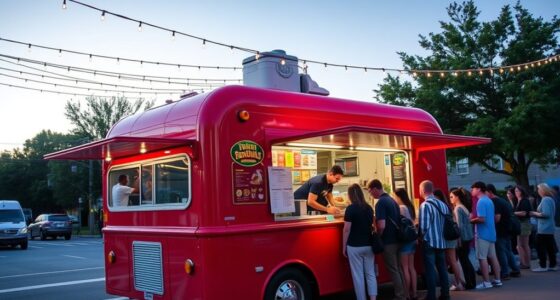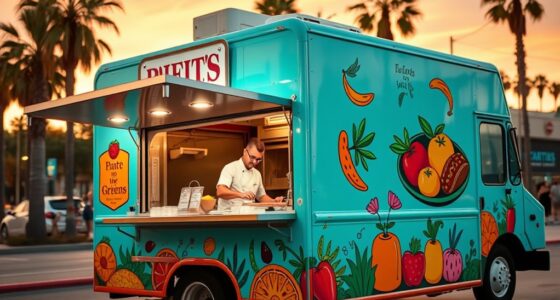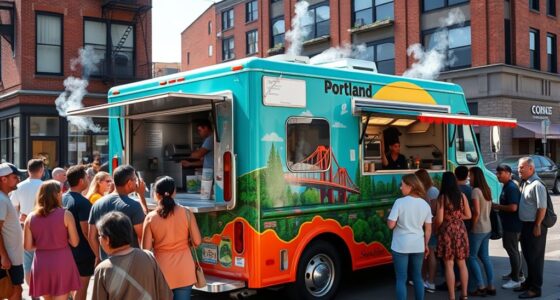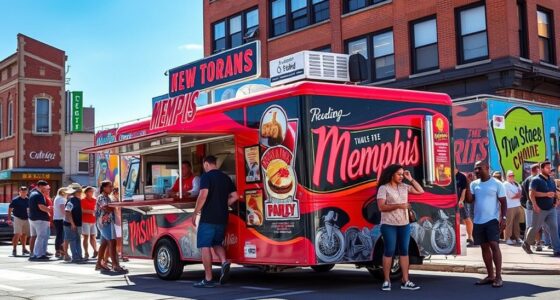To start a food truck in Chattanooga, TN, you’ll need to understand local regulations, including permits, sanitation standards, and designated parking zones. Focus on creating eye-catching designs, offering unique menus with local ingredients, and using technology for payments and inventory. Building community ties and participating in events can help grow your customer base. Keep exploring to learn detailed steps on securing permits, budgeting, marketing, and building a loyal following.
Key Takeaways
- Complete online permit applications through Chattanooga’s digital portal, ensuring all health, safety, and zoning documentation is submitted timely.
- Identify legal street parking zones and adhere to signage restrictions to operate your food truck legally in Chattanooga.
- Secure liability insurance tailored for food trucks to protect your business and meet local requirements.
- Develop a diverse menu utilizing local ingredients, focusing on innovative flavors and creative presentation to attract customers.
- Engage with the community through local events, loyalty programs, and partnerships to build a loyal customer base in Chattanooga.
Food Truck Trends in Chattanooga

Food truck trends in Chattanooga are rapidly evolving, reflecting the city’s vibrant culinary scene and growing appreciation for diverse, on-the-go dining options. You’ll notice that food truck aesthetics play a big role in attracting customers, with eye-catching designs and themes that stand out in busy areas. Menu innovation is also key, as vendors experiment with unique flavor combinations and fresh ingredients to keep offerings exciting. Many trucks incorporate local ingredients and cultural influences, creating memorable dining experiences. This trend toward creative presentation and inventive menus helps vendors build loyal followings and differentiate themselves. Additionally, incorporating visual appeal through creative presentation styles can significantly enhance customer engagement. As Chattanooga embraces these evolving trends, your food truck can thrive by focusing on appealing aesthetics and continuously innovating your menu to match the city’s dynamic tastes.
Understanding Local Requirements

To get started, you’ll need to understand Chattanooga’s online permit application process and gather all required sanitization procedures and documentation. It’s also important to know where you can park your food truck, as designated street zones are vital for compliance. Staying informed about these local requirements helps guarantee a smooth setup and operation. Additionally, familiarizing yourself with pop culture trends can help tailor your food truck offerings to attract more customers and stand out in the vibrant Chattanooga scene.
Online Permit Application Process
Managing the online permit application process in Chattanooga is straightforward once you understand the local requirements. You’ll start by visiting the city’s digital signage portal, where they provide clear instructions and online scheduling options. The city’s website streamlines the application, allowing you to upload necessary documents and select preferred appointment times easily. Make sure your paperwork aligns with local health, safety, and zoning standards before submitting. Chattanooga’s system also offers real-time updates, so you can track your application status without needing in-person visits. Familiarize yourself with specific permit fees and any additional documentation needed for your food truck operation. By following these steps, you’ll navigate the online process smoothly and stay compliant with Chattanooga’s regulations.
Sanitization Procedures and Documentation
Understanding local sanitization requirements in Chattanooga is essential to guarantee your food truck meets health standards and stays compliant. You must follow specific procedures to pass health inspections and keep your operations safe. Keep a detailed cleaning checklist that covers all food contact surfaces, utensils, and equipment. Regularly sanitize high-touch areas and ensure proper disposal of waste. Documentation is vital—maintain records of your sanitization routines, including dates and times. This evidence shows health inspectors that you prioritize cleanliness and food safety. Additionally, a well-organized sanitization plan helps prevent contamination and reduces health risks. Remember, adherence to Chattanooga’s local requirements not only keeps you compliant but also builds customer trust in your food truck’s safety and quality.
Designated Street Parking Zones
Knowing where you can legally park your food truck is essential for smooth operations in Chattanooga. You must identify designated street parking zones that allow food trucks, avoiding violations enforced by parking enforcement officers. Pay close attention to zone signage, which clearly indicates parking restrictions and permitted hours. Some areas may require special permits or have limited time frames, so always verify signage to prevent fines or towing. Understanding local requirements helps you stay compliant and ensures your truck operates efficiently. Regularly check for updates on parking regulations, as they can change. By respecting zone signage and adhering to parking enforcement rules, you can focus on serving customers without concerns over legal issues. Proper parking management is key to building a successful food truck business in Chattanooga.
Setting Up Your Base of Operations
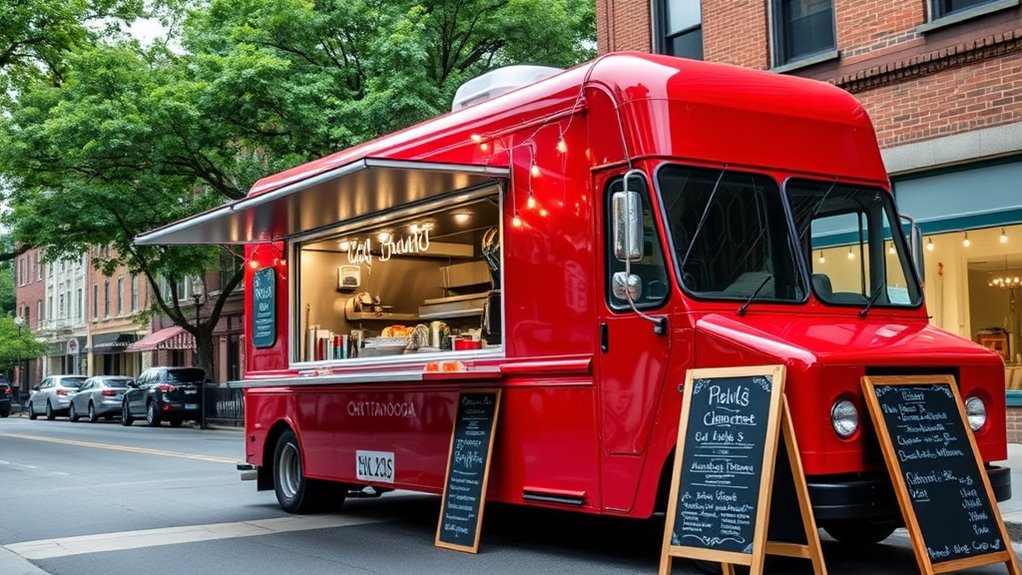
Choosing the right shared kitchen licensing options can save you time and money, so explore what’s available in Chattanooga. Planning your kitchen layout carefully helps maximize space and efficiency for your food truck operations. By considering these factors, you’ll be better prepared to set up a solid base for your business.
Shared Kitchen Licensing Options
Setting up your food truck operation can be streamlined by utilizing shared kitchen licenses, which allow you to legally prepare and store food without investing in a dedicated commercial space. These licenses help you navigate commercial kitchen regulations efficiently, saving time and money. Here’s how they work:
- Access to licensed facilities – You rent space in a shared commercial kitchen that meets health standards, simplifying compliance.
- Flexible hours – You can schedule your cooking times around your needs, making it easier to start small.
- Cost-effective setup – Shared kitchens reduce overhead costs compared to leasing or building your own facility, fitting tight budgets.
Using shared kitchen licensing is a smart move, making it easier to meet legal requirements while focusing on growing your food truck business.
Custom Kitchen Layout Planning
Designing a custom kitchen layout is a critical step in establishing an efficient and functional food truck operation. You need to optimize space by carefully planning kitchen storage to keep ingredients, utensils, and equipment organized and easily accessible. Focus on layout ergonomics to ensure smooth workflow, minimizing unnecessary movement during busy service times. Position cooking appliances, prep stations, and refrigeration units strategically to maximize efficiency and safety. Consider how you’ll load and unload supplies and how staff will move within the limited space. A well-designed layout helps prevent clutter and bottlenecks, saving time and reducing stress. By prioritizing smart kitchen storage solutions and ergonomic design, you’ll create a workspace that supports consistent, high-quality service in your Chattanooga food truck.
Budgeting and Financing Your Food Truck

To get your food truck on the road, you need to plan for initial costs like the vehicle and equipment. Luckily, there are local small business grants that can help ease some expenses. Don’t forget to budget for liability insurance to protect your business and make sure you’re compliant with local regulations. Additionally, understanding mammography guidelines and screening options can help you stay informed about health practices relevant to your community.
Initial Vehicle and Equipment Costs
Starting a food truck requires careful budgeting for initial vehicle and equipment costs, which can vary widely depending on your goals and choices. Your vehicle’s purchase price depends on whether you buy new or used, and factor in vehicle maintenance costs to keep it reliable. Equipment customization is essential to match your menu and workflow, so plan for kitchen appliances, shelving, and POS systems. Here are some key costs to contemplate:
- Vehicle purchase or lease, including initial registration and insurance
- Equipment customization—cooking appliances, refrigeration, and storage
- Maintenance funds for regular vehicle upkeep and repairs
Being precise with these costs helps you avoid surprises, ensuring your investment supports your food truck’s success in Chattanooga.
Local Small Business Grants
Are local small business grants a viable way to finance your food truck in Chattanooga? They can be, especially if you’re looking to reduce upfront costs. Grants often don’t require repayment, giving you extra funds to invest in food truck branding and marketing. With effective social media marketing, you can build buzz early and attract customers. Many local programs target small businesses and startups, making them worth exploring. Be prepared to demonstrate a solid business plan and how the grant will help grow your food truck. While grants can supplement your budget, don’t rely solely on them. Combining grants with personal savings or loans can give you a more complete financial foundation, ensuring you’re ready to launch smoothly.
Liability Insurance for Food Trucks
Securing liability insurance is a key step in budgeting and financing your food truck in Chattanooga, especially as you plan your overall startup costs. Adequate liability coverage protects you against potential claims that could threaten your business. Without proper insurance, an accident or injury could lead to significant financial setbacks. Here are three tips to consider:
- Shop around for insurance policies that specifically cover food trucks to ensure you’re getting tailored liability coverage.
- Understand what your policy includes, especially how it handles insurance claims, so you’re prepared for any incidents.
- Budget for premium costs upfront, knowing that investing in solid liability coverage can save you money and stress later.
Having the right insurance coverage is essential for a smooth start and long-term success.
Designing Your Menu and Pricing Strategy
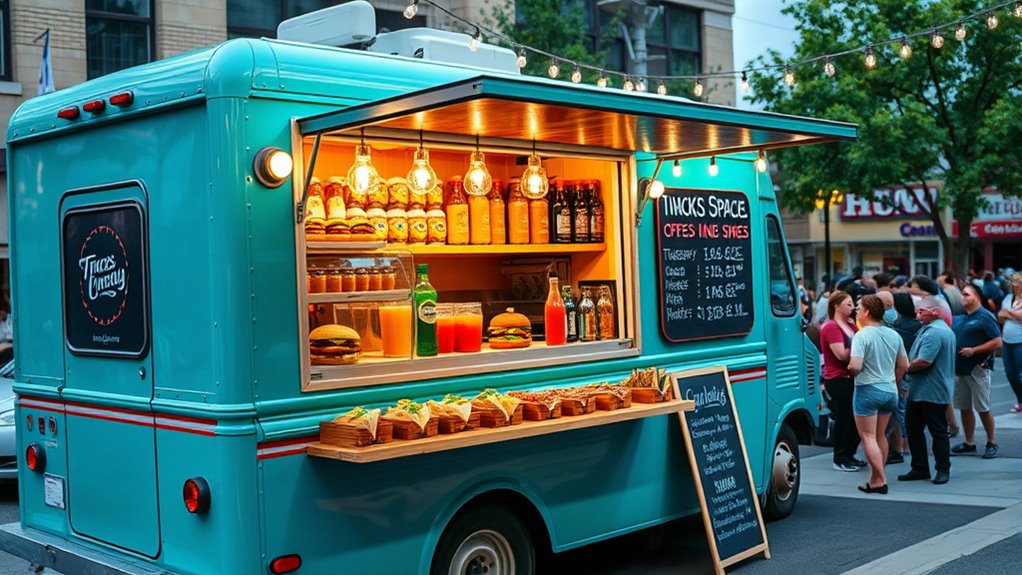
When designing your menu, focus on sourcing local ingredients to keep costs down and appeal to community pride. Calculating the cost per dish helps you set fair prices that cover expenses and attract customers. By balancing quality and affordability, you’ll create a menu that’s both profitable and popular. Incorporating efficient equipment can further streamline your operations and improve overall service.
Locally Sourced Ingredient Selection
Choosing locally sourced ingredients allows you to craft a menu that highlights fresh, seasonal flavors while supporting nearby farmers and producers. By sourcing local produce, you guarantee ingredient quality standards are high, which directly impacts your dishes’ taste and freshness. To successfully select ingredients, consider these steps:
- Build relationships with local farmers and markets to access seasonal, high-quality produce.
- Prioritize ingredient quality standards to guarantee freshness and safety.
- Adapt your menu based on what’s in season, maximizing flavor and minimizing costs.
Focusing on sourcing local produce not only elevates your dishes but also strengthens your connection to the Chattanooga community. This approach helps you create a unique menu that resonates with customers seeking authentic, farm-fresh flavors.
Cost per Dish Calculation
Calculating the cost per dish is essential for designing a profitable menu and setting appropriate prices. To do this, start with accurate ingredient costing, including every component used in each dish. Proper dish portioning ensures consistent serving sizes, which helps control costs and prevent over-portioning. Track the amount of ingredients needed for each menu item and assign a cost to each based on your supplier prices. Add up all ingredient costs for a single serving, including garnishes and condiments. Don’t forget to factor in additional expenses like packaging or utensils if applicable. Once you know your ingredient costs per dish, you can set prices that cover expenses while remaining competitive. This careful calculation guides your pricing strategy and helps maximize your food truck’s profitability.
Technology and Operations
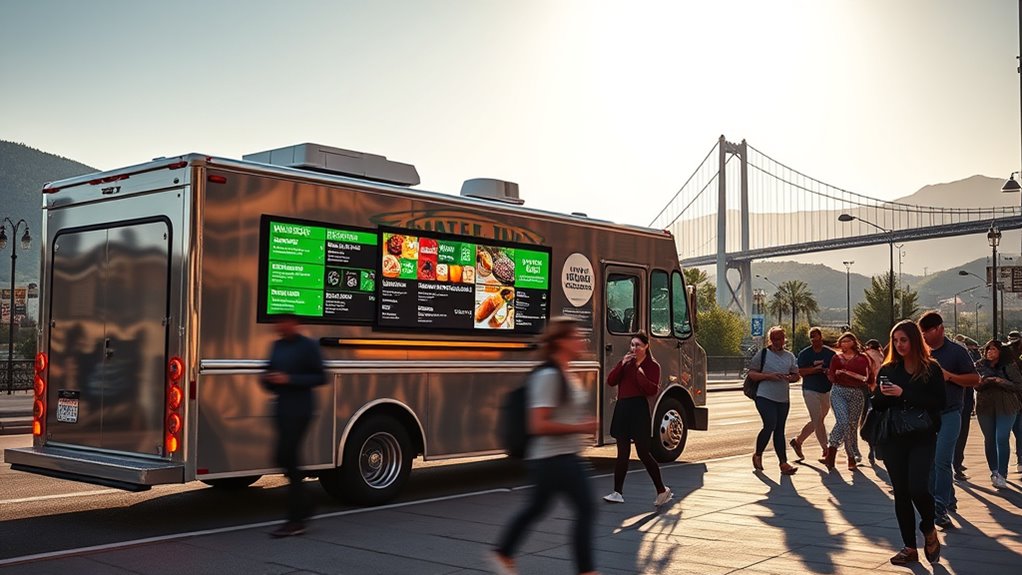
Using mobile payment apps makes transactions faster and more convenient for your customers. Real-time stock tracking software helps you stay on top of inventory and reduce waste. Color accuracy can also enhance the visual appeal of your food truck’s branding and promotional materials, attracting more customers. Together, these tools streamline your operations and improve overall efficiency.
Mobile Payment App Integrations
Integrating mobile payment apps into your food truck operations streamlines transactions and enhances customer experience. With cashless payments, customers can pay quickly without fumbling cash or cards, reducing wait times. Plus, mobile ordering allows patrons to place their orders in advance, speeding up service during busy hours. To make the most of these benefits, consider these key steps:
- Choose reliable payment platforms that support popular mobile apps like Apple Pay and Google Pay.
- Ensure your POS system is compatible with mobile payment integrations for seamless transactions.
- Promote mobile ordering options to encourage customers to use these convenient payment methods.
Real-Time Stock Tracking Software
Implementing real-time stock tracking software is essential for keeping your food truck’s inventory accurate and up-to-date. This technology streamlines inventory management by providing instant updates on ingredient levels, reducing waste, and preventing stockouts. With real-time data, you can quickly identify which supplies need replenishing, ensuring smooth operations during busy hours. It also enhances supply chain coordination by syncing your inventory with suppliers, allowing for automatic reorder alerts. This minimizes delays and helps you maintain consistent menu offerings. Additionally, tracking stock in real-time minimizes manual counting errors, saving you time and effort. Overall, integrating this software creates a more efficient workflow, improves customer satisfaction, and supports your food truck’s growth in Chattanooga.
Marketing and Growing Your Presence
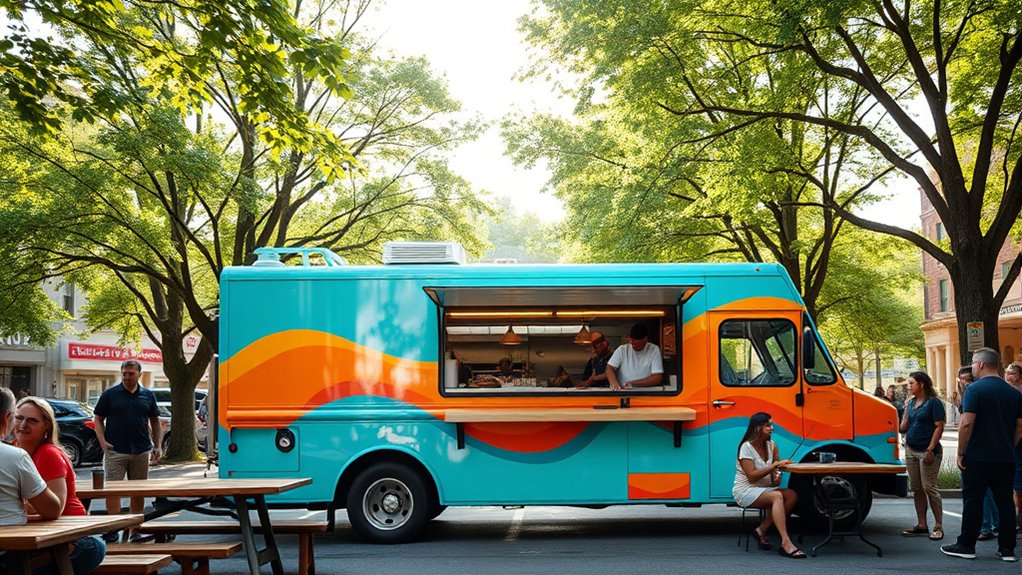
To grow your food truck’s presence in Chattanooga, focus on hitting popular event locations where crowds gather. Consider offering customer loyalty programs to encourage repeat business and build a dedicated following. These strategies can substantially boost your visibility and help establish a strong local reputation.
Popular Food Truck Event Locations
Have you contemplated which locations can best boost your food truck’s visibility and attract more customers? Attending popular food truck events can considerably increase your exposure. Here are some top spots to consider:
- Food truck festivals – These events gather large crowds specifically looking for diverse street food options, giving you prime opportunities to showcase your menu.
- Street food markets – Regular markets or special events in busy downtown areas attract locals and tourists, helping you build a loyal customer base.
- Community events and fairs – Local festivals, concerts, and fairs draw sizable audiences enthusiastic to try new foods, making them ideal for marketing your truck.
Focusing on these locations helps you grow your presence and reach more potential customers efficiently.
Customer Loyalty Programs
Building customer loyalty is a powerful way to grow your food truck’s presence beyond just attracting new visitors at events or busy locations. Implementing customer loyalty programs encourages repeat business and boosts customer engagement. Offer loyalty rewards like punch cards, discounts, or free items after a certain number of visits. These incentives motivate customers to choose your truck over competitors and foster a sense of appreciation. Make it easy for customers to participate by using mobile apps, digital punch cards, or simple sign-up processes. Consistently rewarding loyal patrons helps turn casual buyers into regulars and enhances word-of-mouth promotion. Remember, the key is to create a program that’s simple, rewarding, and keeps your customers coming back for more.
Local Partnerships Boost Visibility
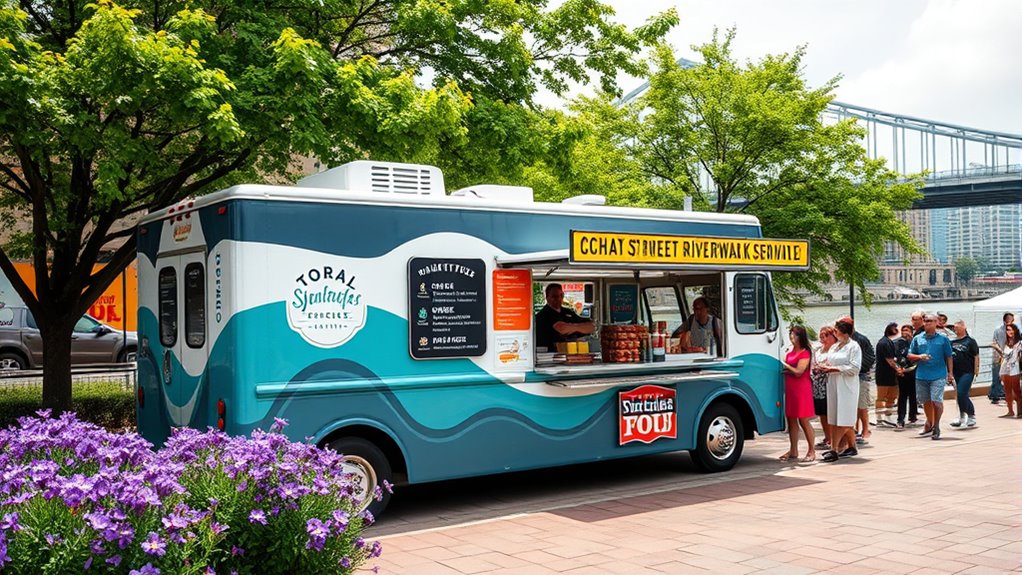
Local partnerships play a crucial role in boosting the visibility of Chattanooga’s food truck scene. When you collaborate with local businesses, events, and organizations, you tap into existing audiences and build a strong community presence. These community collaborations create valuable exposure, attract new customers, and foster loyalty. To get started, consider these strategies:
- Partner with local breweries or coffee shops for joint promotions.
- Participate in community events or festivals to showcase your menu.
- Collaborate with nearby businesses for lunchtime or special event catering.
Frequently Asked Questions
What Permits Are Needed Specifically for Mobile Food Vendors in Chattanooga?
You’ll need a permits overview for mobile vendor licensing in Chattanooga. Start by applying for a mobile food vending permit through the Chattanooga-Hamilton County Health Department, which guarantees your vehicle meets health and safety standards. Additionally, you’ll need a business license from the city, and possibly other permits like a food service license or parking permits. Check with local authorities to confirm all requirements and stay compliant.
How Can I Find the Best Locations for My Food Truck?
You should scout busy areas with good foot traffic, like downtown or near parks, considering parking regulations to make certain you’re legal and accessible. Talk to event organizers about partnerships for festivals, markets, or special gatherings to boost visibility. Use social media and local forums to identify popular spots, and stay flexible to move around based on daily events and customer flow, maximizing your food truck’s success.
Are There Any Local Food Safety Regulations Unique to Chattanooga?
Guiding Chattanooga’s food safety rules is like dancing to a local tune—you need to stay in sync. You must follow Chattanooga ordinances and local health codes, which include specific permits, refrigeration standards, and sanitation protocols. These regulations ensure your food truck operates legally and safely. Check with the Chattanooga-Hamilton County Health Department regularly, as rules may change, and staying compliant keeps your business thriving and your customers safe.
What Are Common Challenges Faced by New Food Truck Owners Here?
As a new food truck owner in Chattanooga, you’ll face common challenges like maintaining your truck and ensuring consistent truck maintenance to avoid breakdowns. You’ll also need to focus on menu customization to attract diverse customers and stand out. Balancing these operational aspects while steering through local regulations can be tough, but staying organized and adaptable will help you overcome obstacles and build a successful business in the vibrant Chattanooga food scene.
How Do I Build a Loyal Customer Base in Chattanooga’s Food Scene?
Building a loyal customer base is like tending a garden; it takes consistent care. You should focus on community engagement by participating in local events and supporting Chattanooga’s vibrant scene. Use social media marketing to share your story, menus, and daily specials, creating a personal connection. Respond to feedback and show genuine appreciation. Over time, these efforts will cultivate a dedicated following that keeps coming back to your food truck.
Conclusion
Starting a food truck in Chattanooga is a smart move, especially with the city’s growing food scene. Did you know that food truck sales nationwide reached $2.7 billion in 2022? By understanding local requirements, creating a unique menu, and leveraging marketing strategies, you can tap into this booming industry. With the right approach, you’ll not only serve delicious food but also build a thriving business in Chattanooga’s vibrant community.
